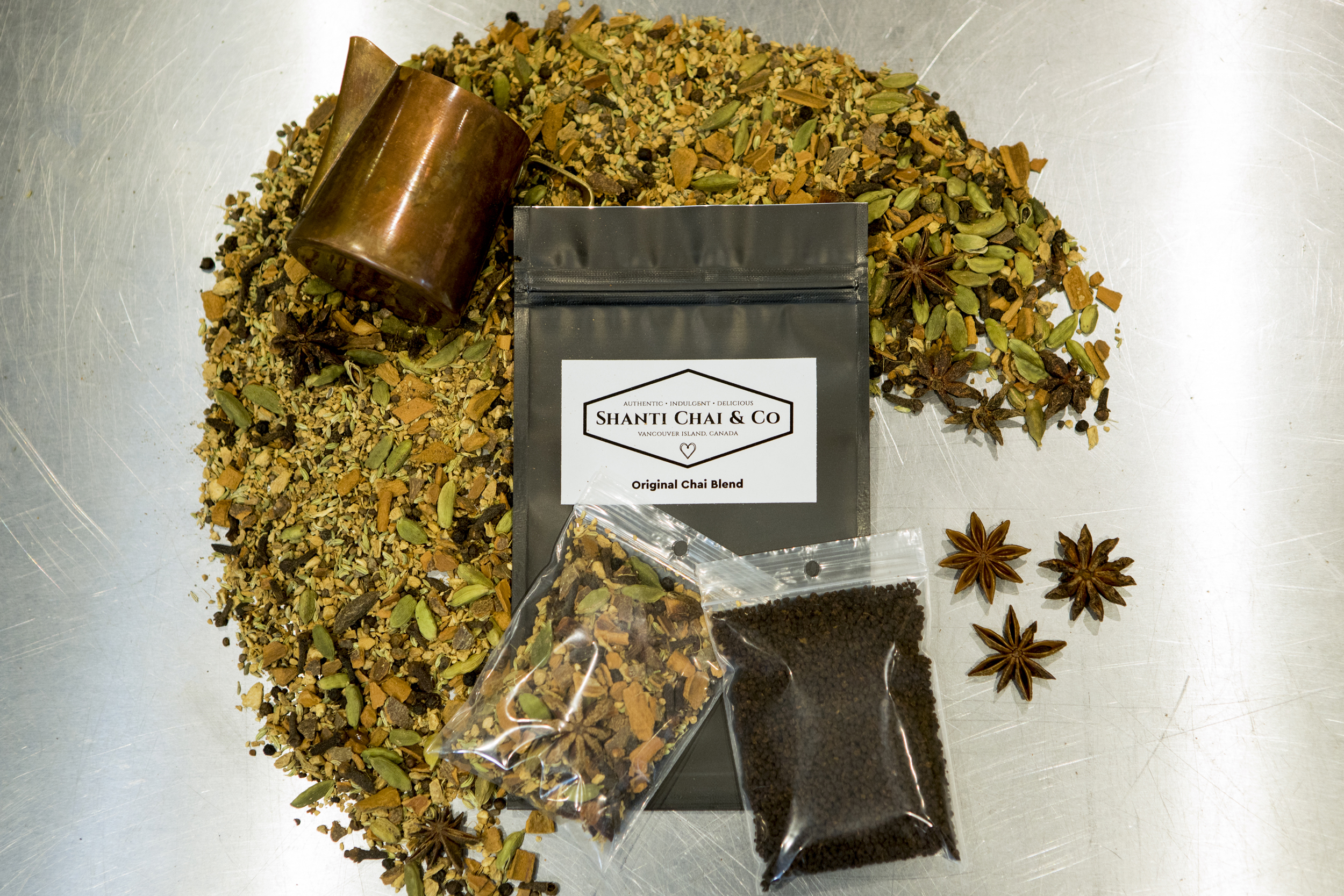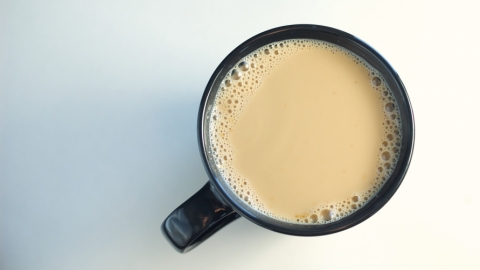Shanti Chai & Co.
 For Shanti Bremer, brewing chai is a ritual. She’s an expeditious person who’s always on the move and she appreciates the opportunity to slow down. She boils spices on the stove until the house fills with the aromas of cardamom, cinnamon and pepper, then adds milk, sugar and black assam tea. Then she’ll sit and enjoy the creamy, spicy drink. “It’s relaxing, it's fun, it smells delicious, [and] it is meditative,” she says.
For Shanti Bremer, brewing chai is a ritual. She’s an expeditious person who’s always on the move and she appreciates the opportunity to slow down. She boils spices on the stove until the house fills with the aromas of cardamom, cinnamon and pepper, then adds milk, sugar and black assam tea. Then she’ll sit and enjoy the creamy, spicy drink. “It’s relaxing, it's fun, it smells delicious, [and] it is meditative,” she says.
Bremer’s family has made chai since she was a child growing up in Olympia, Washington State. A college friend of her father’s, Pravin, lived with their family intermittently, and he made chai every afternoon. She remembers the smell enveloping her childhood home and the chai itself emerging as a coveted super-sweet treat. That tradition has continued into her adulthood. “In my family, we’ll often have chai as a replacement for dessert,” Bremer says. “It takes enough time that we’ll sit around the dinner table an extra half hour and just talk, and it’s such a nice ritual.”
Ritual and family are some of the core values behind her Ladysmith-based business, Shanti Chai & Co., which has been making chai blends since 2017. Her herbalist mom helped create a catalogue of rose petal, candied ginger and turmeric blends. Shanti Chai’s classic original blend is reminiscent of Pravin's chai, the drink Bremer remembers from her youth: heavy on cardamom, cinnamon, star anise and ginger. Each blend comes with brewing instructions, since the process is crucial to bringing out the flavours. As such, Bremer invites her customers to take 20 minutes for chai as an opportunity for pause, connection and quality time.


Chai connections
Eastern traditions have long been familiar to Bremer, as her dad had travelled to India in his youth and been captivated by the culture, teaching himself Sanskrit and choosing Sanskrit names for his daughters. When Bremer was 17, she took a similarly formative trip to India and was hosted by Pravin’s family in Mumbai. She was the same age as his nieces, she remembers, and felt supported by family while still travelling independently. “It was incredibly fun and it changed my life,” she says. In Mumbai, there were chai stands on every street corner. Bremer remembers picking up chai, served in a small cup like espresso, once or twice every day. “It’s just delicious and you get kind of addicted to it,” she says.
Returning to North America, Bremer enrolled at the University of Victoria at 18 and has lived on Vancouver Island ever since. She received a degree in psychology and worked as a social worker while also playing banjo in a Victoria-based acoustic roots trio. But over time, she became homesick for chai, unable to find a traditional brew, and began making her own spice blends at home. Nearly a decade later, a professional crossroads pushed her into chai entrepreneurship. “I had tried on all these different jobs, and all of a sudden it just hit me how much I wanted to be blending chai,” Bremer says.
Within a week, she had perfected the recipe for her Original Chai Blend, registered her business and designed a logo. “Everything started to flow very quickly from that point,” she says. Then she loaded her car with products and hit the road. She took a five-day trip across B.C., stopping intermittently at cafés and grocery stores to offer freshly brewed samples. “People would often be like, ‘Wow, you just came in with chai – that’s so old school,’” Bremer says. “But sitting down for a cup of chai with people is, I feel, the whole point.”
CHAI FYI
Chai is Hindi for tea. Masala chai, or spiced tea, is the brewing method popular in India. It typically contains spices like cardamom, cinnamon, ginger, cloves and peppercorn. Those are simmered and combined with black tea, heavy hot milk and lots of sugar. The result is a spicy, rich, creamy drink, served in small portions, with one-third of coffee’s caffeine.
While chai is widely made in India, it has a relatively short history. It was planted in the Indian state of Assam by the British in the mid-18th century. The British had been previously sourcing tea from China, who had been drinking it for millennia, and the British taste for it had swelled to £40 million annually. India became the biggest black tea supplier in the world and eventually began consuming it in its own style.





